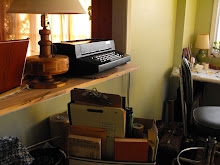the Mandate
The L. S. Benschop Institute supports and promotes the use of imagination and nostalgia in both professional and everyday creative work by providing opportunities and resources to creative workers and the community at large. The Institute participates in and encourages research, development, exhibition, and distribution of imagination- and nostalgia-based creative works. The Institute's opportunities for creative workers include public lectures and open discussions, open critiques, experimental social activities, and other public events. The Institute's resources include the Archive of Miscellaneous Obscurities and Anonymous Belongings and the Institute's Library, as well as the results of the Institute's research. The Institute enjoys a vibrant network of cooperating creative workers willing to share their equipment and experience to creative workers engaged with the Institute. The L. S. Benschop Institute offers a contextual framework and a supportive environment in which to honour, explore, and document for posterity the meaning, function and manifestation of imagination and nostalgia in the creative work of our everyday lives and our fine arts.
another excerpt from "The Challenge of Leisure" by Charles K. Brightbill, 1960.
"In our work, or preparing-for-work environs, spontaneity, which pairs with freedom, is often restrained. This is understandable because the long-range objectives of production and education cannot be readily achieved by departing, according to one's whims and fancies, from the charted course of action. Dedication, repetitive drill, and singleness of purpose are the guide lines. Not so with the recreative life. Spontaneity here is indispensable. It is the voluntary doing that has top priority and is the kernel of freedom. Also in work and formal education the choices are often too rigid. The choice is between the extremes with little or no shading in between. In leisure is does not have to be all or nothing. The recreative life is more like life itself. Life is not all left or all right, all up or all down, all day or all night. The bulk of living is in the middle ground, with a wide range of choices from beginning to end and in between. In leisure the decision need not resolve itself to do-nothing or be-the-expert. We can sit on the side of the pool and dangle our feet in the water without trying to be a member of the club swimming team. We can sketch the country barn without first passing a course in art. We can grow tomatoes because we like to grow them and not because they must be sold at market." p.111
Sugar Shack Summer Art Salon, Calgary AB

Institute in Residence - arrival
summer residency - Creston BC summer 2008

on location, studio space in use